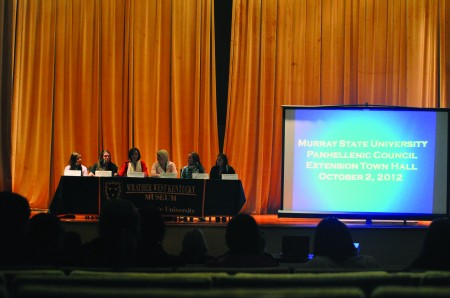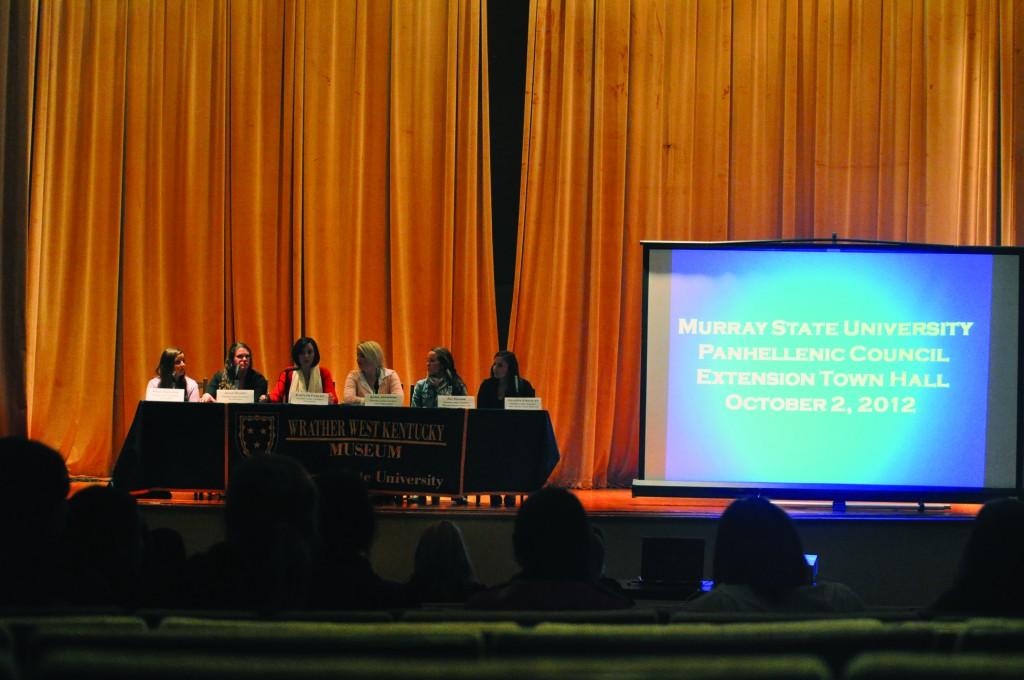
On Oct. 25, Murray State’s Panhellenic Governing Council will be voting on whether or not to bring a new social sorority to campus.
Jason Hinson-Nolen, interim Greek life coordinator, said every sorority is over capacity and now is the best time to expand at the University.
“With the added growth that our University is experiencing and the increased interest in Greek life, we are at a prime chance to take advantage of the influx of potential members by offering a new opportunity,” Hinson-Nolen said.
Panhellenic, the council overseeing the current five social sororities at Murray State will vote on whether or not to open the campus to new national sororities on. Each of the sororities has one speaking delegate who will vote in favor for or against expansion based on what their organization decides.
An exploratory committee voted for expansion after researching student population growth, past experiences and other factors. The vote from Panhellenic will begin the lengthy process of inviting another national sorority to the University’s campus.
If approved, Murray State will be marketed to national sororities and those interested will be invited to submit applications for review. A review committee will then be formed to examine all of the groups of sorority women and decide which organization would fit strongly in the Greek community and on Murray State’s campus.
Each final group of women will be invited to Murray State for in-person discussions and to demonstrate why their organization should be chosen. The review committee and Panhellenic will select a finalist, along with several runner-ups in case the first choice decides to drop out.
In March 2013, a formal invitation will be extended to the national organization Panhellenic chooses. The organization will start recruiting women on campus one week after IFC Rush ends which typically begins three to four weeks into the semester.
When the organization first starts recruiting women, it will be considered a colony. After the new sorority reaches the maximum number of women allowed in a chapter, decided by Panhellenic, they will become a chartered sorority at Murray State.
Because the opinion of the current five social sororities is highly valued, Panhellenic held a town hall meeting, allowing any sorority women to ask questions about expansion. The Panhellenic board and Hinson-Nolen answered any questions women and chapter advisers had.
Valerie Bender, president of Alpha Gamma Delta, attended the meeting and said she felt confident in the discussion.
“After attending town hall, I feel very positive about expansion at Murray State,” Bender said. “The Panhellenic women did a great job researching information about the topic and being able to present and answer any questions.”
At the town hall meeting, Hinson-Nolen outlined expansion in terms of numbers. Currently, the five social sororities on campus have between 103 and 114 members each. This pushed every organization at least 13 women over the total number set by Panhellenic. This is the first year in Murray State’s history where every sorority surpassed their total allowed through fall recruitment.
Since many of the sororities have very small graduating classes this year, most of them would be starting recruitment in the fall with at least 90 members. After bringing in projected pledge classes of at least 30, organizations will be at least 20 women over total.
Hinson-Nolen said a new organization would bring new opportunities to women and help keep total at 90 or slightly above. He said while the numerical benefits are understandable, sorority women are afraid of change in the Greek community because expansion has failed in the past. Ten years ago, Murray State attempted to add a new sorority and the new organization failed.
“The difference between today and the past, is that expansion is a business with a specific set of guidelines, specific criteria and specific professionals, that initiate the initial effort,” Hinson-Nolen said. “In the past, organizations relied on local alumni to conduct the majority of the work, but now we rely on trained professionals that will come to Murray State to recruit.”
At the meeting Sigma Sigma Sigma advisers Kathy Kopperud and Meghan Mottaz questioned the support of Murray State faculty. Before inviting a new organization to Murray State, Kopperud and Mottaz want to make sure the entire University is on board and ready to support the sorority.
Hinson-Nolen said the faculty and staff at Murray State has been behind expansion every time it has been brought up.
“Our current discussions have included input from University faculty members and they are behind the idea of growth in the Greek Community,” Hinson-Nolen said. “Faculty is behind the process because of the positive impact that Greeks have on campus and the statistical data that correlates Greek involvement with continued alumni support of the University.”
Hinson-Nolen said, this year is the prime opportunity for organizations to accept a new sorority. After fall recruitment, the five sororities currently on campus will still gain large pledge classes and have a steady base to support the new organization. Hypothetically, every current organization could skip recruitment and still be at total for the next year.
“Expansion will help Greek life at Murray State University in many ways,” Val Bender, president of Alpha Gamma Delta, said. “After having over two hundred women go through formal recruitment this past spring, our highest number yet, it is foreseeable that we will continue to see Murray State enrollment as well as sorority recruitment numbers increase.”
If for some reason the new organization fails, Hinson-Nolen said there would be no damage to the Greek community.
Said Hinson-Nolen: “The beauty of extension, and the hardest part for members to grasp, is that it does not negatively affect the individual organizations on campus,” Hinson-Nolen said. “It does not steal their potential members, it does not cause dues to go up in individual organizations and it does not require work by the existing organizations to be successful.”
Written by Lexy Gross, Staff writer.




























































































